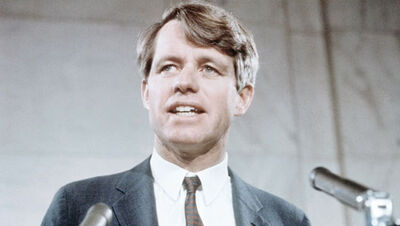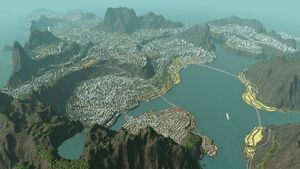"The first duty of society is justice."
Civil Rights: World Benchmark
Economy: Frightening
Political Freedom: Widely Abused
The Commune of Waguania is a massive, genial nation, ruled by the Trade Union Congress with a fair hand, and renowned for its museums and concert halls, daily referendums, and punitive income tax rates. The compassionate, democratic population of 3 billion Waguanians are free to do what they want with their own bodies, and vote for whomever they like in elections; if they go into business, however, they are regulated to within an inch of their lives.
The enormous, socially-minded, outspoken government juggles the competing demands of Education, Welfare, and Healthcare. It meets to discuss matters of state in the capital city of Miranda. The average income tax rate is 92.5%, and even higher for the wealthy.
The frighteningly efficient Waguanian economy, worth 525 trillion labor vouchers a year, is driven entirely by a combination of government and state-owned industry, with private enterprise illegal. The industrial sector, which is quite specialized, is led by the Information Technology industry, with significant contributions from Tourism, Book Publishing, and Cheese Exports. Average income is an impressive 140,430 labor vouchers, and distributed extremely evenly, with little difference between the richest and poorest citizens.
The most penniless demographics have by far the highest number of researchers per capita, supervisors in Waguania commonly tie bells on their necks to alert employees of their presence, the new national mascot has to be wheeled onto the field of play, and waste is frequently shipped to other countries. Crime is totally unknown, thanks to a well-funded police force and progressive social policies in education and welfare. Waguania's national animal is the Waggle, which frolics freely in the nation's many lush forests, and its national religion is Secularism.
Political and Geographical Overview[]
Waguania is located off the east coast of The Chiss Descendancy, making its waters highly trafficked by friendly Chiss patrols. An island nation composed of many different cultures and ethnicities, its people are united under a shared way of life; the end of the militant Dauntless regime brought about a new era of socialism, with the central government being reorganized into a federal republic.
The republic is divided into three provinces: Nevis and Pence, the two small islands to the north, and Izaak, the large southern island which is also home to the nation's prosperous coastal capital of Miranda. While private enterprise is technically illegal, worker-owned cooperatives that shift their priorities according to the democratically planned economy are ubiquitous in Izaak, while small fisheries, bakeries, and souvenir shops are also popular nationwide.
Despite its small size, Waguania maintains a respectable military force, particularly with regards to its navy. With relatively few men and women in active service, the navy has several thousand individuals in reserve, all of whom volunteered in exchange for a small monthly stipend of Praetors. Due to the country's sophisticated naval efforts, thick jungles, and a polite populace with a guaranteed right to keep firearms in their homes for self-defense, Waguania remains a well-defended nation that makes invasion by foreign powers a deadly gambit.
The coveted Burr, a winged creature renowned for its grace and stoicism, is a common sight in coastal woodland areas and serves as the national animal. Unfortunately, tourists who wander invade the Burr's personal space or otherwise pose a perceived danger to the bird are often mauled by its venomous claws. Extracted Burr venom is a highly prized (and highly illegal) export for poachers; as a protected species, Burr poaching is a serious crime.
Government[]
Waguania, officially the Commune of Waguania, is a highly decentralized nonpartisan democratic socialist republic. Combining elements of anarcho-syndicalism and market socialism, the Commune is organized mostly into local self-governing syndicates, with the larger Trade Union Congress in Miranda harboring little executive power apart from economic planning and the forming of militias; policing and local laws are left to the individual syndicates. Small private "mom and pop" businesses are common and encouraged, but larger corporations must follow the democratic worker-cooperative model and are heavily regulated.
The republic is organized into worker-managed democratic trade unions, which represent workers in each aspect of society; these unions range from the Construction Workers of Waguania (CWW) to the United Nurses Association, with each union being proportionately represented in the overarching Grand Assembly of Labor Unions or simply the Workers' Assembly, the main governing body of Waguania. Unions elect trusted representatives of their trades to attend the Assembly, express the concerns of their constituents, and propose new legislation. Larger unions with more workers are granted more delegates, and strict constitutional guidelines and nation-wide referenda ideally keep legislative monopolies from forming.
The General Secretary of the Grand Assembly is directly elected and evaluates the constitutionality of all legislation and represents the Assembly's will internationally; the General Secretary cannot veto any bills, but can break legislative ties and is trusted with setting the agenda of the Assembly at the start of every year. The executive office can be held by any citizen of Waguania belonging to any trade union or political party, but must forfeit all ties to such organizations upon entering office. Terms are four years long with a maximum of three consecutive, and Presidents may be impeached at any time by majority vote among the delegates of the GALU, in which case the Secretary's fate is decided by a nation-wide referendum.
General Secretary Seth Burr
While the General Secretary is decided by popular vote, the Deputy Secretary is nominated by the Grand Assembly and acts as intermediary between the unions and the head of state, entrusted with keeping the Assembly adequately represented in the executive branch as well as invoking impeachment votes and convening the unions in emergency situations. Neither the General nor the Deputy Secretary can take military action without Assembly approval, unless a credible outside force directly threatens Waguanian soil or that of its allies.
Deputy Secretary Maggie LaScola
Income and consumption tax do not exist in any traditonal sense; all essential services from plumbing to healthcare are provided by the unions, and workers are compensated for their labor with "vouchers," capped at 100,000 per year (adjusted by Assembly legislature), which are used to purchase luxury goods and other non-essential services. Individuals with occupations with less perceived concrete societal value, such as theatre and painting, receive their vouchers directly from consumers of their art (ie, attendees of performances and purchasers of paintings) distributed by their unions. Vouchers may be exchanged for international currency with no value in Waguania and vice versa at state exchange stations.
Worker cooperatives, established by the state and democratically run by their own employees, range wildly in size, with each belonging to a larger trade union (ex. Miranda Electric and Greater Izaak Utilities cooperate within the Electrical Workers Federation from across the country). Cooperatives generally function as small-scale democratic republics, with workers electing chairpeople to manage the company and democratically (or in extreme cases with violent force, as constitutionally guaranteed) removing these representatives if they no longer represent the workers. Emerging industries are first overseen by state committees to ensure productivity and long-term economic efficiency and then organized into new trade unions when they accrue a given amount of workers.
The official anthem of FSR Waguania is The Internationale, though much of the populace favors the traditional folk hymn Solidarity Forever as the symbol of Waguanian national identity. Both are used to convene and adjourn the Grand Assembly respectively.
Parties[]
Political parties in the Commune of Waguania have been abolished since the Trade Union Congress of 2018, which ruled with popular concensus that over-involvement of the parties in the worker syndicates resulting in political entrenchment and allegations of partisan allegiances among union delegates warranted the disbanding of the parties entirely. All trade unions and delegates were subsequently registered as independent.


















